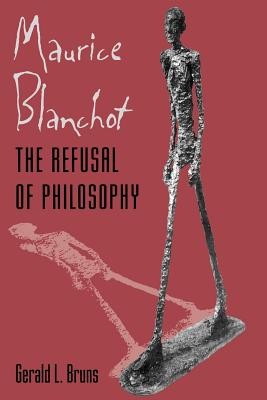
- We will send in 10–14 business days.
- Author: Gerald L Bruns
- Publisher: Johns Hopkins University Press
- ISBN-10: 0801881994
- ISBN-13: 9780801881992
- Format: 15.6 x 22.8 x 1.9 cm, softcover
- Language: English
- SAVE -10% with code: EXTRA
Reviews
Description
A series of close readings addresses the philosophical and political questions that have surrounded Blanchot and his writings for decades
Selected by Choice Magazine as an Outstanding Academic Title
As a novelist, essayist, critic, and theorist, Maurice Blanchot has earned tributes from authors as diverse as Jacques Derrida, Giles Deleuze, and Emmanuel Levinas. But their praise has told us little about what Blanchot's work actually says and why it has been so influential. In the first comprehensive study of this important French writer to appear in English, Gerald Bruns ties Blanchot's writings to each other and to the works of his contemporaries, including the poet Paul Celan.
Blanchot belongs to the generation of French intellectuals who came of age during the 1930s, survived the Occupation, and flourished during the quarter century or so after World War II. He was one of the first French intellectuals to take a systematic interest in questions of language and meaning. His focus in the mid-1930s on extreme situations--death, madness, imprisonment, exile, revolution, catastrophe--anticipated the later interest of the existentialists. Like Nietzsche, Wittgenstein, and Adorno, Blanchot was a self-conscious writer of fragments, and he has given us one the most developed investigations that we have on the fragment as a kind of writing.
In a series of close readings, Bruns addresses the philosophical and political questions that have surrounded Blanchot and his writings for decades. He describes what is creative in Blanchot's readings of Heidegger's controversial works and examines Blanchot's conception of poetry as an inquiry into the limits of philosophy, rationality, and power.
EXTRA 10 % discount with code: EXTRA
The promotion ends in 17d.09:21:46
The discount code is valid when purchasing from 10 €. Discounts do not stack.
- Author: Gerald L Bruns
- Publisher: Johns Hopkins University Press
- ISBN-10: 0801881994
- ISBN-13: 9780801881992
- Format: 15.6 x 22.8 x 1.9 cm, softcover
- Language: English English
A series of close readings addresses the philosophical and political questions that have surrounded Blanchot and his writings for decades
Selected by Choice Magazine as an Outstanding Academic Title
As a novelist, essayist, critic, and theorist, Maurice Blanchot has earned tributes from authors as diverse as Jacques Derrida, Giles Deleuze, and Emmanuel Levinas. But their praise has told us little about what Blanchot's work actually says and why it has been so influential. In the first comprehensive study of this important French writer to appear in English, Gerald Bruns ties Blanchot's writings to each other and to the works of his contemporaries, including the poet Paul Celan.
Blanchot belongs to the generation of French intellectuals who came of age during the 1930s, survived the Occupation, and flourished during the quarter century or so after World War II. He was one of the first French intellectuals to take a systematic interest in questions of language and meaning. His focus in the mid-1930s on extreme situations--death, madness, imprisonment, exile, revolution, catastrophe--anticipated the later interest of the existentialists. Like Nietzsche, Wittgenstein, and Adorno, Blanchot was a self-conscious writer of fragments, and he has given us one the most developed investigations that we have on the fragment as a kind of writing.
In a series of close readings, Bruns addresses the philosophical and political questions that have surrounded Blanchot and his writings for decades. He describes what is creative in Blanchot's readings of Heidegger's controversial works and examines Blanchot's conception of poetry as an inquiry into the limits of philosophy, rationality, and power.


Reviews